
Writing Numbers Correctly in English: British vs. American Style and Legal Importance
In the world of English writing, numbers play a crucial role, whether it’s in a formal legal document, an academic paper, or everyday communication. However, different regions, particularly the United Kingdom and the United States, follow distinct conventions for writing numbers, and getting it right is essential, especially in legal English.
British vs. American Style:
- British Style: In the UK, it is common to spell out numbers from one to twelve and use numerals for numbers above twelve. For example, “five cats” and “17 dogs.”
- American Style: In the US, the rule is a bit more flexible. Generally, numerals are used for numbers over nine, but there are exceptions, especially in informal writing. For instance, “five cats” or “17 dogs” is acceptable, although “five” and “17” are numerals.
Why it Matters in Legal English:
Precision is paramount in legal documents, where ambiguity can lead to costly disputes or unintended consequences. Whether you’re drafting a contract, a will, or any legal text, adhering to a consistent and universally accepted style for writing numbers is crucial. It ensures that everyone interprets the document in the same way, leaving no room for misunderstanding.
10 Steps to Writing Numbers Correctly:
- Know Your Style: Determine whether you’re following British or American style. This choice will guide how you write numbers throughout your text.
- Spelling Out Small Numbers: In both styles, numbers one through nine are usually spelled out, e.g., “four,” “eight.”
- Using Numerals for Larger Numbers: The rule of thumb is to use numerals for numbers 10 and above. For instance, “15” instead of “fifteen.”
- Consistency is Key: Stick to one style throughout your document. Don’t switch from “seven cats” to “14 dogs” in the same paragraph.
- Exceptions in Legal Text: Legal English often employs numerals for dates, percentages, and other figures. For instance, “2% interest” or “On December 5, 2023.”
- Decimal Points: Decimal numbers are typically written in numerals. For example, “3.14” rather than “three point one four.”
- Ordinal Numbers: For legal texts, use numerals with the appropriate abbreviation (e.g., “1st,” “2nd,” “3rd,” “4th,” “5th”) when denoting order or rank.
- Currency: Use numerals with the respective currency symbols or abbreviations, such as “$100” or “£50.”
- Measuring Units: Numerals should be used for measurements, such as “5 miles,” “10 kilograms,” and “3 liters.”
- Clarity: In cases where using numerals can lead to ambiguity, consider spelling out the number to ensure clarity. For example, “The court sentenced him to one hundred and twenty days in prison.”
In conclusion, correctly writing numbers in English is essential, especially in legal contexts. The choice between British and American style should align with your audience and location. By following the established conventions and maintaining consistency, you can ensure that your legal documents are precise, unambiguous, and legally sound, reducing the risk of disputes or misinterpretations. So, the next time you draft a legal document, pay careful attention to how you write your numbers—it could make all the difference.